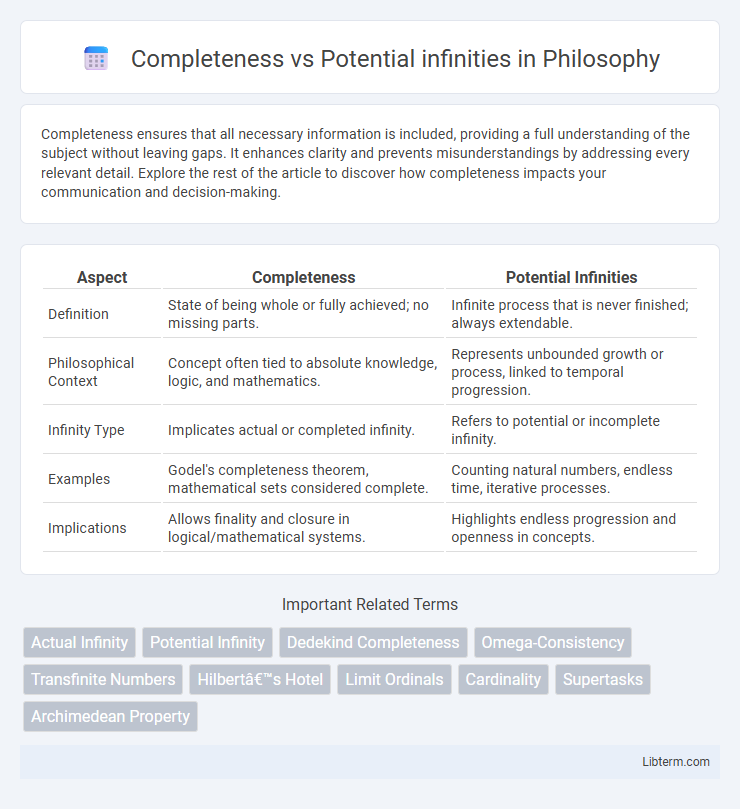Completeness ensures that all necessary information is included, providing a full understanding of the subject without leaving gaps. It enhances clarity and prevents misunderstandings by addressing every relevant detail. Explore the rest of the article to discover how completeness impacts your communication and decision-making.
Table of Comparison
| Aspect | Completeness | Potential Infinities |
|---|---|---|
| Definition | State of being whole or fully achieved; no missing parts. | Infinite process that is never finished; always extendable. |
| Philosophical Context | Concept often tied to absolute knowledge, logic, and mathematics. | Represents unbounded growth or process, linked to temporal progression. |
| Infinity Type | Implicates actual or completed infinity. | Refers to potential or incomplete infinity. |
| Examples | Godel's completeness theorem, mathematical sets considered complete. | Counting natural numbers, endless time, iterative processes. |
| Implications | Allows finality and closure in logical/mathematical systems. | Highlights endless progression and openness in concepts. |
Understanding Completeness and Potential Infinity
Understanding completeness involves recognizing a set or system where all elements or cases are fully contained and accounted for, ensuring no gaps or omissions exist. Potential infinity refers to an unending process or progression that can continue indefinitely without reaching a final completed totality. Distinguishing completeness from potential infinity is crucial in fields like mathematics and logic, where the former implies a finalized whole and the latter signifies an ongoing, never-fully-realized expansion.
Historical Perspectives on Infinity
Historical perspectives on infinity distinguish between completeness and potential infinities, with early mathematicians like Aristotle emphasizing potential infinity as an unending process rather than a finished totality. The concept of completeness, or actual infinity, gained mathematical rigor through Cantor's set theory in the late 19th century, which introduced the notion of different sizes of infinite sets. Philosophical debates around these ideas shaped the development of modern mathematics, influencing theories in calculus, logic, and the philosophy of mathematics.
Mathematical Foundations of Completeness
Mathematical foundations of completeness revolve around understanding whether a system, such as the real numbers, contains all possible limits of Cauchy sequences, ensuring no gaps exist. Completeness contrasts with potential infinities, which represent processes that can continue indefinitely without forming a completed totality. The distinction is critical in analysis, where completeness guarantees convergence and stability within a metric space, while potential infinities describe unbounded but not fully realized collections.
Potential Infinity in Set Theory
Potential infinity in set theory refers to an unending process where elements can be continually added to a set without ever forming a completed infinite totality. This concept contrasts with actual infinity, which treats infinite sets as completed wholes, allowing full manipulation as fixed entities. Potential infinity emphasizes the dynamic, ever-extending nature of sets, foundational in understanding arithmetic progressions and infinitely generated sequences.
Comparing Actual and Potential Infinity
Actual infinity refers to a completed, infinite totality that exists as a whole, while potential infinity describes an endless process that never attains completion. In mathematical and philosophical contexts, actual infinities are treated as fixed infinite sets, such as the set of natural numbers, whereas potential infinities represent a dynamic, never-ending sequence or growth. This distinction influences the conceptualization of infinity in set theory, calculus, and metaphysics, shaping foundational debates on the nature of infinite quantities and processes.
Completeness in Mathematical Structures
Completeness in mathematical structures ensures that every Cauchy sequence converges within the space, a critical property in fields like real analysis and functional analysis. This property distinguishes complete metric spaces, such as the real numbers \(\mathbb{R}\), from incomplete ones like the rational numbers \(\mathbb{Q}\), enabling robust limit and continuity operations. Completeness guarantees that the structure is closed under limit processes, which is essential for solving equations and performing analysis within the given mathematical framework.
Philosophical Implications of Infinity
The philosophical implications of completeness versus potential infinities center on the nature of mathematical truth and the limits of human knowledge. Completeness asserts that a formal system can fully capture all truths within its scope, while potential infinity emphasizes an unending process, challenging the notion of a final or totalized infinite set. This tension raises profound questions about the foundation of mathematics, the ontology of infinite entities, and the epistemological boundaries of formal reasoning.
Practical Examples: Completeness vs Potential Infinity
Completeness in mathematics often refers to the property of a system where every element or set is fully accounted for, such as the completeness of real numbers ensuring no gaps exist. Potential infinity describes processes or quantities that grow without bound but remain finite at each stage, like counting natural numbers indefinitely. Practical examples include calculus, where the completeness of real numbers allows limits to exist, while potential infinity underpins iterative methods and sequences that approach but never reach a limit.
Debates in Mathematics: Which Infinity Prevails?
Debates in mathematics over completeness versus potential infinities revolve around whether infinite sets are fully realized entities or ever-expanding processes. Cantor's set theory supports the existence of actual infinities as complete totalities, exemplified by the cardinality of the set of real numbers, which is strictly larger than that of natural numbers. Critics advocating for potential infinity view infinity as a limit never fully attainable, emphasizing constructive mathematics and finitist perspectives, which challenge the acceptance of completed infinite sets in mathematical reasoning.
Future Directions in Infinity Research
Future directions in infinity research explore the relationship between completeness concepts and potential infinities, especially in set theory and mathematical logic. Investigations focus on refining axiomatic frameworks to better capture the nuances of infinite processes and structures, emphasizing the distinction between completed infinities and those that remain perpetually extending. Emerging studies aim to integrate these perspectives to advance our understanding of infinite hierarchies and their applications in theoretical computer science and cosmology.
Completeness Infographic

 libterm.com
libterm.com